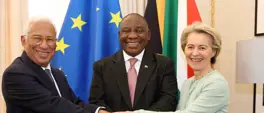MALAIKA MAHLATSI | Ramaphosa, Biya and the normalisation of the abnormal in Africa
Malaika Mahlatsi
15 July 2025 | 10:08'The presidents of both countries are being applauded for regressive and damaging behaviour by the people who should be holding them to account for it.'

Cameroon's President Paul Biya waits for the arrival of France's president for talks at the Presidential Palace in Yaounde on 26 July 2022. Picture: AFP
On Sunday, two abnormal things happened in two different African countries, and they are being reported in the media and spoken about in society as if they are normal.
The first is that a 92-year-old man who has been in office for 43 years announced to the world that he would be running for re-election. Paul Biya, the oldest serving head of state in the world, has been leading the central African nation of Cameroon, which has one of the youngest populations on earth.
The median age in Cameroon is significantly low, with the male median age at 18.66 years and the female median age at 19.
Over half of Cameroonian citizens are under the age of 25. Specifically, more than 60% of the population is under 25.
In 2023, approximately 41.76% of Cameroon's population was aged 0 to 14 years. The young age dependency ratio, which represents the proportion of people under 15 relative to the working-age population (15-64), was around 75.29% in 2023.
The highest concentration of adults is in the 18 and 19-year-old age groups, while the lowest concentration is in the 70+ year-old age group. This is expected given that Cameroon has a total life expectancy of approximately 59 years.
Many things about Biya’s re-election bid are abnormal. The most glaring is that Biya, who has presided over a fractured state confronted by economic challenges and insecurity on several fronts, including a drawn-out separatist conflict in its English-speaking regions, enjoys the support of people who should be most uncomfortable about his rule.
Members of the governing Cameroon People’s Democratic Movement (CPDM) and other supporters, many of them young men and women, have, since last year, publicly called for Biya to seek another term.
What this means is that generations of people most affected by the lack of imagination of a nonagenarian, people who understand what is at stake when a leader does not have an appreciation of the complexities of a modern and evolving world, are giving legitimacy to their own regression.
A second abnormal thing that happened in Africa was the announcement by President Cyril Ramaphosa that corruption-accused Minister of Police, Senzo Mchunu, has been placed on leave while a Judicial Commission of Inquiry investigates allegations of involvement with criminal syndicates made against him by KwaZulu-Natal Provincial Police Commissioner, Lieutenant-General Nhlanhla Mkhwanazi.
The abnormality in this announcement is that Mchunu has been caught red-handed in the commission of a crime. Mchunu’s crime is that he blatantly lied to Parliament, which is a criminal offence under both common law and parliamentary legislation.
On 5 March 2025, Mchunu stood before Parliament’s Police Portfolio Committee, and while under oath, stated that he did not know a Brown Mogotsi – the man at the centre of the allegations levelled against Mchunu by Mkhwanazi.
Mkhwanazi said he received texts and confidential documents from Mogotsi, who is alleged to be the police minister's acquaintance.
But just a few days ago, on 9 July 2025, Mchunu released a public statement admitting that he does, in fact, know Mogotsi and describing him as “a comrade” rather than an associate.
Mchunu’s conduct breached the Parliamentary Code of Conduct and violated the Powers and Privileges Act, according to which it is a criminal offence to make any attempt to mislead or obstruct Parliament or its committees.
Therefore, by placing Mchunu on leave rather than demanding his resignation on the basis of committing a criminal offense and breaching the Parliamentary Code of Conduct, Ramaphosa who just a few weeks ago was seemingly a moral and ethical man when he fired Democratic Alliance former Deputy Minister of Trade, Industry and Competition, Andrew Whitfield, is effectively communicating that laws do not apply equally to everyone.
In a normal society, both Mchunu and Ramaphosa would be held accountable for such blatant disregard of the law. But this did not happen. Instead, some sections of society are clapping hands for what they deem a rational response by Ramaphosa to Mkhwanazi’s allegations, completely ignoring the fact that even without findings by a Judicial Commission of Inquiry, grounds already exist for Mchunu’s removal.
These two unrelated incidents in Cameroon and South Africa have one important common denominator. It is that the presidents of both countries are being applauded for regressive and damaging behaviour by the people who should be holding them to account for it.
Just as the young people of Cameroon support a 92-year-old man running for re-election, knowing that the implications include more years of a dearth of progressive modern ideas that will lead the country to prosperity, reasonable people in South Africa are applauding unethical conduct from their leaders, knowing that it sets parameters for the erosion of democratic values on which our society is built.
It is not normal, and should not be normal, that rational-thinking people see nothing wrong with allowing old men to govern with such complete disregard.
It is only in Africa where a minister who is caught red-handed in the commission of a crime would be placed on leave (or in the case of Dr Nobuhle Nkabane, the Minister of Higher Education who also committed the crime of lying to Parliament, allowed to continue serving in the Cabinet). Such things are so taboo in other parts of the world that the minister would not even wait for the president to contemplate what action must be taken.
They would voluntarily step down, understanding what their continued stay in Cabinet means for the erosion of public trust in the executive entirely, but in the country as a whole.
Consider how, just seven months ago, South Korea's interior minister, Lee Sang-min resigned following the declaration of martial law that plunged the country into turmoil. Sang-min said he was stepping down "in grave recognition of responsibility for failing to serve the public and the president well".
Just two months ago, Japan’s farm minister, Taku Eto, stepped down following public outrage over his comments that he did not buy rice, but received it for free from his supporters. These transgressions pale in comparison to what ministers are doing in the South African Cabinet.
It is only in Africa where a 92-year-old man insists on remaining in office when, for 43 years, they have failed to resolve some of the most basic challenges confronting the country, and such a man finds support among those most affected by these challenges.
Consider how, in 2023, the then Prime Minister of New Zealand, Jacinda Arden, stepped down from her position, stating that she no longer had the energy to fulfil the demands of the position.
Here was a 42-year-old hard-working and progressive woman stepping down because she recognised that she did not have the energy to continue with the demanding work of leading a country. But in Cameroon, a man more than twice that age insists on being re-elected, to serve in that office until he is almost 100 years old.
The way that governance is done in Africa is abnormal. The impunity with which constitutional delinquents are treated on the continent is abnormal. We are constantly rewarding unethical leaders, then wondering why there is such widespread lawlessness and moral decay in our communities. But more than what leaders are doing to us, the things that we as Africans are willing to accept about those leaders are abnormal.
We are willing to accept and support the worst elements in society – from presidents who stand trial for rape and then, in a country torn asunder by the HIV/AIDS epidemic, claim that they took a shower to prevent infection, to presidents who allegedly cover up crimes in their own private properties.
We are willing to accept and support 92-year-olds who want to plunge us into perpetual underdevelopment, as well as kleptomaniacs who treat public resources like family inheritance.
We reward criminals and unethical people with the highest offices in our lands. We have, in Africa, normalised the abnormal, and we are going to pay a heavy price for generations to come.
Malaika, an award-winning, bestselling author, is a geographer and researcher at the Institute for Pan African Thought and Conversation. She is a PhD in Geography candidate at the University of Bayreuth in Germany.
Get the whole picture 💡
Take a look at the topic timeline for all related articles.















